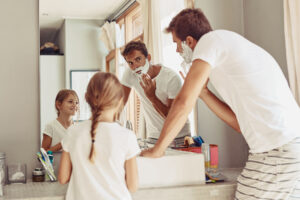Asperger’s and Hygiene: Solutions for an Overlooked Issue

Why Is Hygiene Such a Difficult Issue?
Problems with hygiene for the child or adolescent with AS appear to stem from two things: sensory issues and social awareness. Many children with AS will refuse to shower or to brush their teeth. Although caregivers may initially believe that these responses are due to laziness on the part of the child, in many instances refusal to engage in personal hygiene activities results from sensory issues encountered by the child. In an effort to illustrate this point, consider the AS child who has difficulty trying new foods because of their texture. Inserting a toothbrush with abrasive toothpaste into the mouth can overwhelm the child’s senses, creating an aversion to brushing one’s teeth. As a result, the AS child may not willingly brush his or her teeth each night despite efforts to educate the child about the potential harm that may result.
A lack of social awareness may also impact decision making when it comes to personal hygiene. As children mature into adolescence, their personal hygiene needs become more extensive. Boys and girls will need to use deodorant, shave, comb their hair, and make sure they are properly and appropriately dressed. These hygiene issues are particularly important for adolescents in order for them to project a positive self-image that is acceptable to their peers. Because many adolescents with AS lack a basic understanding of social awareness, hygiene issues may not be an important consideration for this group. Putting on deodorant may not be viewed as important by the adolescent with AS despite the fact it is necessary to prevent body odor: an obstacle which can hinder peer interaction.
What Can Be Done?
With the realization that hygiene is such a difficult and challenging issue for children and adolescents, it is important for caregivers to consider what they can do to promote personal hygiene without overwhelming their child or adolescent with sensory issues or negative criticism. Although the specific hygiene needs of each child will be different, there are some steps that parents and caregivers can take to improve outcomes in these areas:
- Make personal hygiene a part of the daily routine: Routine and structure are important components for reducing stress in children and adolescents with AS. By making personal hygiene activities such as brushing teeth and showering a part of daily life, individuals with AS will come to view these activities as an integral part of their daily lives. This can reduce the stress of engaging in activities that may cause sensory challenges.
- Model personal hygiene for your child: Same-sex parents should work with the child or adolescent to model personal hygiene activities. For instance, a male caregiver should help a teenage boy learn to shave. By modeling behavior, the caregiver not only provides an important teaching support but also serves as a role model for the importance of certain hygiene activities.
- Consider the use of accommodations to make personal hygiene easier: One example that is useful in this area is the use of electric toothbrushes to address sensory issues related to teeth brushing. Electric toothbrushes can provide stimulation to the gums and teeth that is soothing for the child with AS. The use of accommodations may make personal hygiene activities more enjoyable for children with AS.
- Consider professional help and support: If you continue to struggle to promote personal hygiene issues with your child or adolescent, consider professional help. Therapists may be able to assess your child’s needs to provide instruction and education that is commensurate with your child’s ability to understand hygiene issues. Therapists can work with you to translate skills learned in the therapeutic setting to the home. As your child matures into adolescence and sexual maturation occurs, help in guiding your child through professional expertise may be essential.
The preceding article was solely written by the author named above. Any views and opinions expressed are not necessarily shared by GoodTherapy.org.